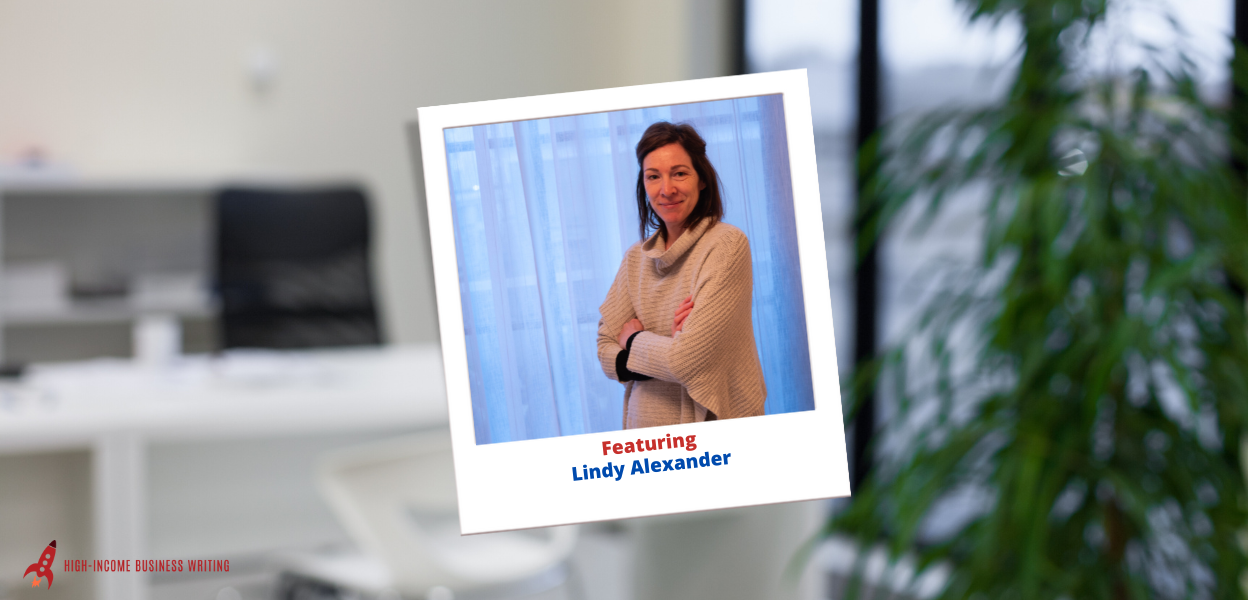For many years there has been a myth among journalists that journalism and content marketing can’t coexist.
You either have to focus on journalism work or on content marketing, but not on both.
But this belief is based on false assumptions and outdated beliefs. And in this week’s episode, you’ll hear why you can do both very successfully as a freelance writer.
And, in fact, why you may actually WANT to focus on both.
My guest is Lindy Alexander, an award-winning freelance food, travel and lifestyle writer and content creator living in the vibrant goldfields town of Castlemaine in central Victoria, Australia.
Her work has been published in numerous digital and print publications including Sunday Life, The Age/The Sydney Morning Herald, The Guardian, Travel + Indulgence, Travel + Leisure Southeast Asia, delicious, Good Food, The Saturday Paper, SBS Life, Dumbo Feather, Peppermint, Essential Kids, Essential Baby, Modern Farmer, Jetstar magazine and Homes+.
I had Lindy on the show a few years ago, where we discussed how to grow your income by going deeper with clients and leveraging key relationships. This time, we’re directly tackling the age-old myth that content marketing and journalism are incompatible.
You’ll hear exactly how Lindy has navigated these waters like a champ. How’s she’s maintained solid journalistic standards and ethics throughout. And how you can combine both to create real synergies in your business.
The notes that follow are a very basic, unedited summary of the show. There’s a lot more detail in the audio version. You can listen to the show using the audio player below. Or you can subscribe on Apple Podcasts, Spotify, Stitcher, Google Podcasts, Amazon Music or wherever you listen to podcasts.


High-Income Business Writing with Ed Gandia
#341: Crossing Paths: Lindy Alexander’s Secrets to Succeeding with Journalism and Content Marketing
Key Topics and Bullets:
- Different processes for magazines vs. content marketing
- Strategy for balancing prospecting and pitching
- Exploring other opportunities alongside journalism
- Leveraging work from one area to get opportunities in another
- Importance of full disclosure and communicating boundaries
- Identifying specific niches and adjacent markets
- TheFreelancersYear.com and its offerings
- Transition from social work to freelance writing
- Mix of journalism and content marketing
- Prestige for journalists in content marketing
- Networking, referrals, and securing writing opportunities
- Caution in approaching sources for additional work
- Importance of maintaining integrity and finding fulfillment in writing
Timestamp Overview:
04:31 Lindy– in 2017, my husband took a year off from his work and he had our kids and was looking after our kids while I said to him, I wanna see if I can make this work for us. So we had a mortgage. We had all the bills to pay, and I did my maths beforehand and thought I cannot keep writing stories, feature stories that take me hours to interview, research, transcribe, submit. Also, I’m getting paid on publication when I submit as a journalist. I just couldn’t see that I could make the income that I needed to make. So I had to look further afield and start to think about content marketing. And really that episode where Jennifer was talking about her content marketing clients and how she found them, I think, Ed, I probably listened to it 2, 3, 4 times because it was so inspiring, but it was so practical as well. And I really used that as my base to find content marketing clients.
07:44 Ed– Maybe a big fear is that if I do that, then it’s 1 or the other. You know, I won’t be able to do both successfully. I know you’ve already addressed this. You say that you do both. But let’s unpack that a little bit. Tell me, why is that not true?
Lindy– I think there’s a few reasons. I think that some people feel that it’s unethical, that I can’t be an ethical journalist. And I’ve had people say to me, I feel like I’m selling my soul. I feel I’m so ethical as a journalist. And I feel like if I started doing content marketing writing, then somehow I’d be going over to the dark side, and I would be writing copy that didn’t resonate with me and didn’t feel good. And I’d have to be writing for companies that didn’t align with my personal values. And I think that is a really big misconception. And, actually, one of the freelance writers in one of my courses, she came in and she thought, I don’t know, but I really wanna write for ethical only companies. Now ethical means something different for everybody.
12:12 Ed– So start with your clips. Start with what you’ve done.
Lindy– And as a journalist or someone with freelance writing or feature writing, you’re very good at investigating. And I think that’s the slight difference that, I feel like it took me a while to get my head around exactly what you just said, who is selling into his companies. And I think it’s not just what you see at eye level, like with journalism. It’s people, it’s companies, it’s places. And often the b to b world is hidden from us mere mortals usually. And so it’s just about doing some digging, some really thinking really thinking about, well, what are these emergency services? What sorts of products, services are they using to run their businesses? What software? What apps? What, administration platform? Whatever it might be. And as you start to dig, it’s like this whole world just starts to open up and it’s something that is invisible to most people in daily life, I think.
14:44 Ed– Let’s talk about from a marketing standpoint, how do you navigate things such as your LinkedIn profile? You know, now I feel like I’m 2 different people. So which one do I put out there just on LinkedIn as an example and or my website?
Lindy– You are talking directly to me. And this is something that I struggled with on a number of levels because I’m a generalist. And everybody says everybody says you need to be a specialist. What’s your specialization? What’s your niche? And I didn’t have one. And I agonized over it for years because I never had that beautiful, One was that I recognized that nothing is set in stone so that you can put something on your LinkedIn profile. And if it doesn’t resonate, if it doesn’t work, if you’re not getting leads, you can change it. So it isn’t something that you’ve etched and then that is the front of your shot forever and ever.
19:30 Ed– So how do you figure out how to do and manage your marketing time and resources? Right? So there’s pitching on the journalism side. There is prospecting on the content marketing side. There are some similarities, but still there, you have to go find work. How do you figure out that balance? You know any ideas, recommendations there?
Lindy– And that process is really different. Like I often think the difference between prospecting and pitching for magazines is like you’re walking into a restaurant. And with prospecting, when you’re sending out your LOIs, you’re really showing the customer, the client, what you’ve got, like in your kitchen garden. These are all the different things I have. If you sent an LOI, a pitch like that to a magazine, I can do this. I can do this. What about this? I’ve also got this. They’re not gonna be interested.
23:16 Ed– What what I’m hearing from you in my experience working with coaching clients has been that, hey, you know, once you make the decision and you commit, I think you might be pleasantly surprised by the opportunities and how they’re really not on the dark side. And they can enable you to then, you know, find opportunities on the journalism side that you would have normally not been able to take if that was all you were doing. So, let’s talk a little bit about ethics because this is an area where I’m not very clear on. And maybe you can educate us a little bit or at least me. Can you leverage one to get the other? So can I talk about my, you know, specific journalism experience and clips? And I know mostly the answer is yes. We’ve already talked about it. But what about the other way around? You know, so if you’ve written pieces in this area or for this specific industry or topic, where do you draw the line and where do you, where do you have more latitude? Can you speak to that a little bit?
Lindy– Yeah. And this is something I see a lot of riders struggling with, especially when they’re working for a company or an organization, and they’re doing deep work for them. And then they say, you know what? Their CEO is innovating in ways that are so exciting and so interesting. And I would love to write a feature story about them, But they’re paying me to write white papers for them or they’re paying me to write case studies or whatever it might be. And it is tricky. And I think you can do it, and I have done it, but my approach is always full disclosure. So I would say to an editor, I have been doing some work for this company, and I’ve come across this person in this company. I think it would make a great story.
25:25 Lindy– Would you be interested in me writing about them? And sometimes they say yes. Sometimes, do you know what they’ll do? If they’ll pay me, like a discovery fee, and they’ll say, we’ll assign one of our staff writers to them, but thank you for bringing, you know, that person to our attention. Now often with that discovery fee, I’m like, oh, I don’t know how I feel about that because you’re getting paid from both sides of the fence. But similarly, I know a lot of travel writers who are also doing public relations work. And I think as long as you are very clear in communicating where those boundaries are and letting everybody know which side of the fence is paying you because you cannot be paid from both sides of the fence for the same thing at the same time.
Ed-Is timing a huge part of this? So let me give you a specific example. Let’s say that I’m doing a story and I’m reaching out to some subject matter experts for interviews. And some of these or could be potential content marketing writing clients for me. Obviously, I’m not gonna say at the end of the interview, by the way, thank you. And if you ever need someone to help you write white papers and case studies, I would love that. But could I come back maybe once that project or this article is closed? You know, may or maybe do I have to wait a long time? Could I do this at some point? Because I could go back to these sources and pitch them?
27:40 Lindy– I think probably about 4 months later, the CEO of that organization reached out to me and said, we have all this marketing material, all these blog posts we need written. Would you be interested in coming on board and doing that for us? And I did that, and they paid super well. And that relationship has continued. And I think what happens is that often when you are talking to subject matter experts, often they don’t know freelance writers. They’re not sure. They need a writer a few months down the track, but they’re like, I don’t know anyone. Then they’re like, oh, there was that journalist who interviewed me. I’m gonna reach out and see if they can do it or if they know someone.
33:40 Ed– I think it’s wise advice. So, as we start wrapping up, I wanna kinda come back full circle to this idea that, you know, the way we started this conversation is you may have some passion topics. And as a let’s say you are now in the content marketing side or have been there, but really would love to kind of come back and do some feature stories on topics that are meaningful to you, either because you have a passion or a hobby or that is a cause that means something to you. And and and you would love to be able to do that. Right? I would love your reaction to this idea and react however you’d like. Maybe our business doesn’t have to fulfill every single desire and need that we have. You know, maybe that’s an unfair expectation of our core business. What would you say to that?
Lindy– Yeah. I would agree. I have some qualifications, probably. I think sometimes people feel, I know I did, that I’m dragging myself to content marketing. I’m gonna have to do it to make money. I felt really resigned about it. And then I get in there and I’m like, this is just like journalism except it’s paying me better. And so I was writing these think pieces for a health organization, a public health organization.
36:08 Lindy– But what I’m seeing is that a lot of the writers I work with in my programs, they come from journalism. They realize if I’m gonna earn good money in good time and not work 80 hour weeks, I need to add some content marketing into this mix. So they do content marketing, but a lot of them still feel this need to, as you said, pursue stories that fill them up, whether that is destinations, experiences, people, causes. They want to practice their creativity and write their own stories, come up with their own ideas rather than being given a brief or coming up with a strategy for a company. And so I think if you look at it in that context, your business can fulfill those desires if you have that balance. And I think the beautiful thing about writing is that you can find places that really do fill your cup, both in the content marketing and the journalism space.
Ed– I would agree wholeheartedly with that. I haven’t had the journalism experience, but I found out by accident that the stuff that I was writing eventually for my clients was a lot of fun. I didn’t realize that I was a business geek until I started writing for these software companies that were solving big business problems for their market. And I thought that is fascinating because what they’re doing is giving their customers a competitive advantage. From a technology standpoint, in a world that’s really hard to gain those advantages. And I thought that was just really, really cool. So I don’t know. Maybe it came like that passion or that interest was natural.
39:42 Ed– So, Lindy, I wanna make sure I send people to you and your networks and your social media. Where can I send them? And then what’s new and cool in your world that you’re excited about?
Lindy-So my website is the freelancersgear.com, and on there is a courses and resources page. So I’ve got lots of free resources and a $9 spreadsheet that has over 270 different publications to pitch to with their publication guidelines. So if you’re looking at, yeah, reviving some of your journalistic skills and wanting to pitch some publications but aren’t sure who’s paying and what they’re paying and what you need to do, that is a really great resource. And, yeah, I have a program called Write, Earn, Thrive that I run twice a year for. And it’s a lot of journalists who come into that who want to earn more money from content writing. And I’m just about to launch very soon a new small group intensive for people who wanna break into their dream publications and write feature articles for their dream publications.
By the way… whenever you’re ready, here are 4 ways I can help you grow your freelance business:
1. Grab a free copy of my book.
It’s called Earn More in Less Time: The Proven Mindset, Strategies and Actions to Prosper as a Freelance Writer. The title says it all. 😉 — Click Here
2. Get my Business-Building Toolkit.
Too many freelancers lack a critical set of business skills that would enable them to earn more in less time doing work they love for better clients. I’ve taught these skills to my coaching clients for years. And now I’ve packaged it in a way that will enable you to start getting results FAST. — Learn More
3. Join my implementation program and be a case study.
I’m putting together a new implementation group this month. If you’re earning $5k+/month (or the part-time equivalent) from your freelance business … and you’d like to grow your income quickly with better clients … just hit reply and put “Case Study” in the subject line.
4. Work with me privately.
If you’re a 6-figure writer who’s trying to earn more in less time, with less stress, I might be able to help you get there faster than you think. Just email me at ed@b2blauncher.com and put “Breakthrough” in the subject line, and I’ll get back to you with more details.






